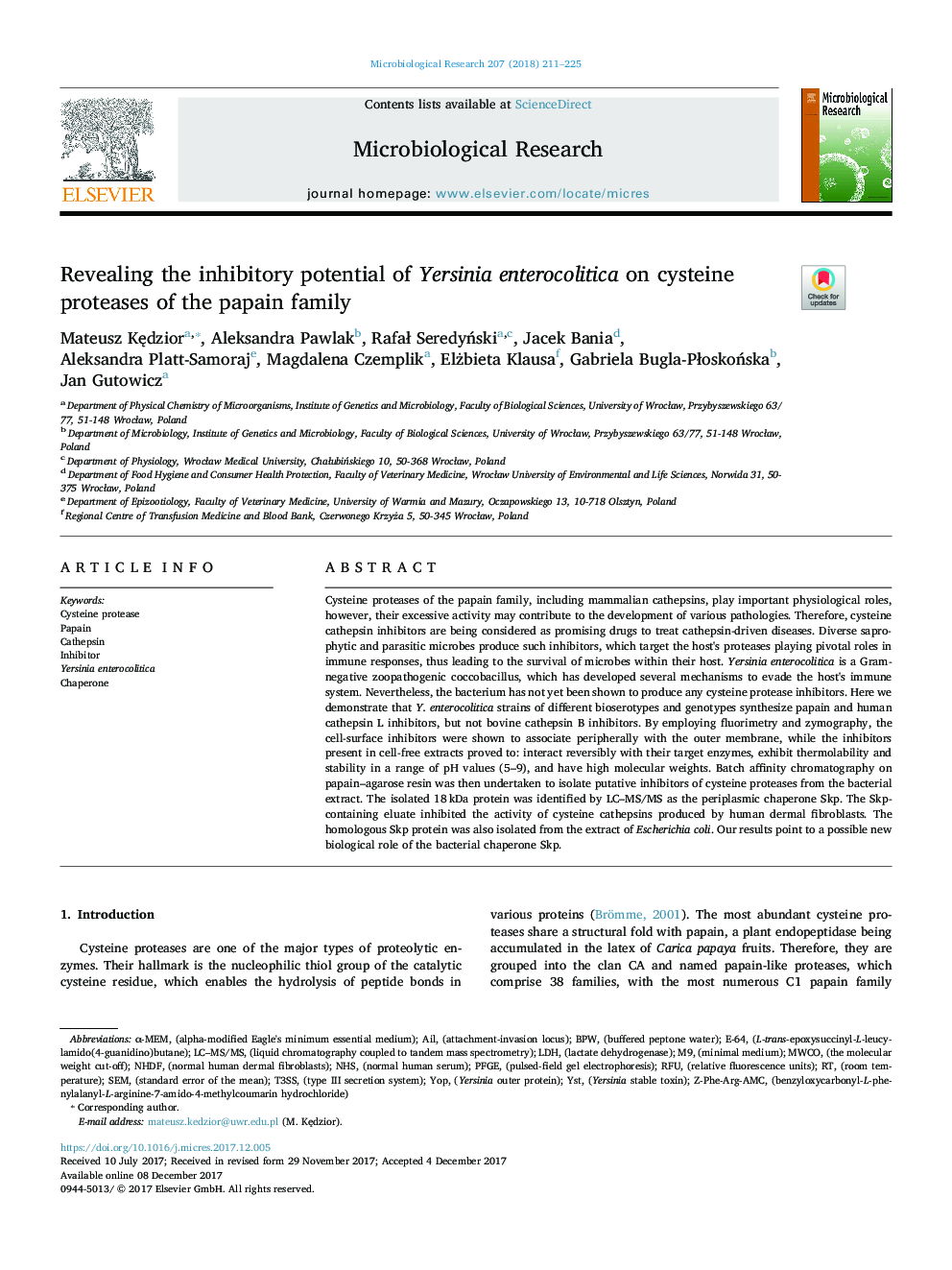| کد مقاله | کد نشریه | سال انتشار | مقاله انگلیسی | نسخه تمام متن |
|---|---|---|---|---|
| 8423250 | 1545967 | 2018 | 15 صفحه PDF | دانلود رایگان |
عنوان انگلیسی مقاله ISI
Revealing the inhibitory potential of Yersinia enterocolitica on cysteine proteases of the papain family
ترجمه فارسی عنوان
کشف پتانسیل مهار کننده یرسیینا انتروکولیتیکا بر پروتئازهای سیستئین خانواده پاپایان
دانلود مقاله + سفارش ترجمه
دانلود مقاله ISI انگلیسی
رایگان برای ایرانیان
کلمات کلیدی
ChaperoneZ-Phe-Arg-AMCPFGERFUYSTAILNHDFT3SSE-64α-MEMNHSYersinia enterocoliticaMWCOBPWLC–MS/MS - LC-MS / MSInhibitor - بازدارندهCysteine protease - سیستئین پروتئازLDH - لاکتات دهیدروژناز به صورت مختصر شده LDH SEM - مدل معادلات ساختاری / میکروسکوپ الکترونی روبشیPapain - پاپائینCathepsin - کاتپسینYop - یوپ
موضوعات مرتبط
علوم زیستی و بیوفناوری
بیوشیمی، ژنتیک و زیست شناسی مولکولی
بیوتکنولوژی یا زیستفناوری
چکیده انگلیسی
Cysteine proteases of the papain family, including mammalian cathepsins, play important physiological roles, however, their excessive activity may contribute to the development of various pathologies. Therefore, cysteine cathepsin inhibitors are being considered as promising drugs to treat cathepsin-driven diseases. Diverse saprophytic and parasitic microbes produce such inhibitors, which target the host's proteases playing pivotal roles in immune responses, thus leading to the survival of microbes within their host. Yersinia enterocolitica is a Gram-negative zoopathogenic coccobacillus, which has developed several mechanisms to evade the host's immune system. Nevertheless, the bacterium has not yet been shown to produce any cysteine protease inhibitors. Here we demonstrate that Y. enterocolitica strains of different bioserotypes and genotypes synthesize papain and human cathepsin L inhibitors, but not bovine cathepsin B inhibitors. By employing fluorimetry and zymography, the cell-surface inhibitors were shown to associate peripherally with the outer membrane, while the inhibitors present in cell-free extracts proved to: interact reversibly with their target enzymes, exhibit thermolability and stability in a range of pH values (5-9), and have high molecular weights. Batch affinity chromatography on papain-agarose resin was then undertaken to isolate putative inhibitors of cysteine proteases from the bacterial extract. The isolated 18â¯kDa protein was identified by LC-MS/MS as the periplasmic chaperone Skp. The Skp-containing eluate inhibited the activity of cysteine cathepsins produced by human dermal fibroblasts. The homologous Skp protein was also isolated from the extract of Escherichia coli. Our results point to a possible new biological role of the bacterial chaperone Skp.
ناشر
Database: Elsevier - ScienceDirect (ساینس دایرکت)
Journal: Microbiological Research - Volume 207, March 2018, Pages 211-225
Journal: Microbiological Research - Volume 207, March 2018, Pages 211-225
نویسندگان
Mateusz KÄdzior, Aleksandra Pawlak, RafaÅ SeredyÅski, Jacek Bania, Aleksandra Platt-Samoraj, Magdalena Czemplik, Elżbieta Klausa, Gabriela Bugla-PÅoskoÅska, Jan Gutowicz,
